3MT 2025
Biomedical and Biological Sciences Ph.D. Candidate Wins 2025 Three Minute Thesis Competition
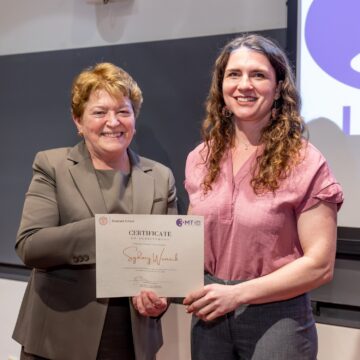
“One in six people will develop knee osteoarthritis by the time they are 60 years old,” began Sydney Womack, a biomedical and biological sciences doctoral candidate and doctor of veterinary medicine student, at the 10th Cornell University Three Minute Thesis (3MT) competition. “Osteoarthritis is a joint disease which causes symptoms like pain and stiffness, and there are no drugs available that can slow the progression of the disease and are safe for people to use in the long term. Don’t you wish we had a way to really study diseases like osteoarthritis and develop new therapies?”
Alongside seven other finalists, Womack presented her dissertation research in just three minutes on March 19 to a panel of judges and an audience from across campus while additional friends, family, advisors, and lab mates watched online. Presentations were judged by how clearly and compellingly students summarized their research to a general audience, using only one static slide.
Womack’s presentation, “Joint Disease Across Species: The Bee’s Knees,” earned her first place and $1,500. Second place and $1,000 was awarded to food science and technology doctoral candidate Ranee Anderson for her presentation, “Phage on Patrol: A High-Speed Biosensor for Salmonella.”
After 107 in-person and virtual audience members cast their ballots, votes were tallied and the People’s Choice Award and $250 were presented to geological sciences doctoral candidate Sara Miller for her presentation, “The Motion of an Alien Ocean.”
The judges for Cornell’s 3MT included Jane Bunker, director for Cornell University Press; Marc Faris, senior manager for Custom Instructional Design at eCornell; Lyza Maron, grant development lead for Climate Finance Solutions and chief grants officer for Enzymatic; and Gregory Ray, Don and Margi Berens Professor of Entrepreneurship at the Cornell S.C. Johnson College of Business. Organization of the competition was provided by the Graduate School Office of Career and Professional Development.
“3MT gave me the opportunity to present my work in a way that a lot of people can understand and also made me think about my work in a different way. When you’re in the lab, just doing things at the bench or at the computer, it’s really easy to get lost,” said Womack. “It was really nice to take a step back and look at my research, see how it fits together, and turn it into a story that people might find interesting and engaging.”
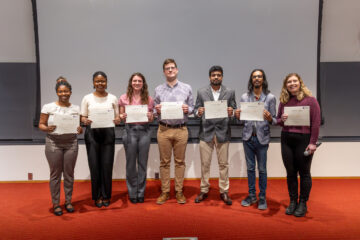
In addition to wanting to conquer a fear of public speaking, Womack was inspired to compete by watching another student in her field who successfully pared down her research to just three minutes in the 2024 3MT. Anderson similarly thought that being able to speak on her topic in just a few minutes would be an “interesting challenge” with practical applications.
“It’s very good when you go to live conferences or anywhere, and people ask, ‘What do you do?’ Three minutes is enough time for them to listen,” she said, adding that the experience taught her how to adjust the way she speaks about her research for different audiences. “It was a very creative task to find words that everyone could understand and to make the research interesting to other people.”
Miller also enjoyed the process of crafting her presentation and applying science communication skills in a new way that will allow her to easily share her research going forward.
“I love having this three minute pitch,” she said. “I practiced it on some of my family members, and even my mom and my sister, people who I talk to regularly, said, ‘Wow, I didn’t realize what you did before this,’ so it’s pretty cool. I’m very proud to have something that I can give to extended family or a neighbor and for them to really understand what I do.”
The 3MT competition was first held in 2008 at the University of Queensland and has since been adopted by over 900 universities in over 85 countries. 3MT challenges research degree graduate students to present a compelling story on their dissertation or thesis and its significance in just three minutes, in language appropriate to a non-specialist audience.
Cornell’s Graduate School first hosted a 3MT competition in 2015 and the event has grown steadily since that time. As the winner of Cornell’s competition, Womack will now go on to compete in northeast regional competitions.
“The Three Minute Thesis final round is a highlight of the year for those of us in the Graduate School,” said Kathryn J. Boor, dean of the Graduate School and vice provost for graduate education. “It’s an opportunity to watch our accomplished and very creative graduate researchers communicate about their work, and all with the added excitement of prizes.”
2025 3MT Finalists
Watch the 2025 Three Minute Thesis (3MT) competition.
First Place: Sydney Womack, biomedical and biological sciences doctoral candidate and veterinary medicine doctoral student
Watch Sydney Womack’s presentation.
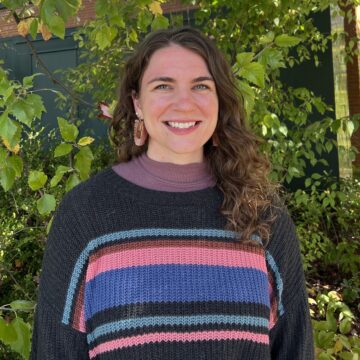 Presentation Title: “Joint Disease Across Species: The Bee’s Knees”
Presentation Title: “Joint Disease Across Species: The Bee’s Knees”
Special Committee Chair: Heidi Reesink
Area of Research: Osteoarthritis, joint pain, joint fibrosis
Biography: Sydney is a combined D.V.M./Ph.D. candidate in biomedical and biological sciences. She completed her B.S. in biomedical engineering at the University of South Carolina in 2021. As a future veterinary scientist, Sydney studies both naturally-occurring and induced knee osteoarthritis in animals with the goal of improving human and animal medicine.
Favorite Thing About Cornell: Being a part of the wonderful and quirky Ithaca community!
Second Place: Ranee Anderson, food science and technology doctoral candidate
Watch Ranee Anderson’s presentation.
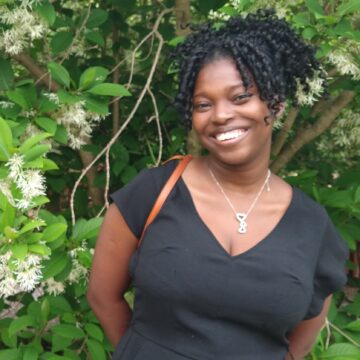 Presentation Title: “Phage on Patrol: A High-Speed Biosensor for Salmonella”
Presentation Title: “Phage on Patrol: A High-Speed Biosensor for Salmonella”
Special Committee Chair: Sam Nugen
Area of Research: Phage engineering
Biography: Ranee Anderson is a fourth-year doctoral candidate in the department of food science. Her research focuses on engineering phages to develop rapid biosensors for pathogen detection, enhancing pathogen separation and expanding the phage host range. Apart from her Ph.D. she enjoys travelling, public speaking, craft, and woodworking.
People’s Choice Award: Sara Miller, geological sciences doctoral candidate
Watch Sara Miller’s presentation.
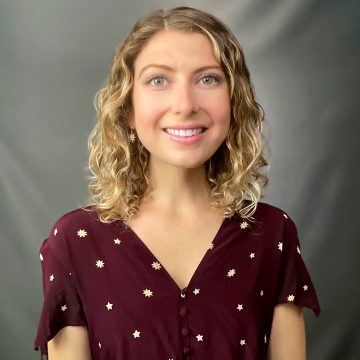 Presentation Title: “Modeling the Motion of an Alien Ocean”
Presentation Title: “Modeling the Motion of an Alien Ocean”
Special Committee Chair: Britney Schmidt
Area of Research: Physical oceanography of icy moons in the outer solar system
Biography: Sara is a doctoral candidate in earth and atmospheric sciences. Her research focuses on the internal dynamics of icy ocean worlds in the outer solar system. She is particularly interested in Jupiter’s moon Europa. Sara holds a B.S. and M.S. in aerospace engineering from the Georgia Institute of Technology.
Linda Kalunga, food science and technology doctoral student
Watch Linda Kalunga’s presentation.
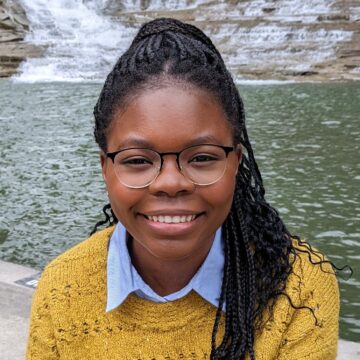 Presentation Title: “Using AI to Detect High Risk Areas for Germs in Food Processing Plants”
Presentation Title: “Using AI to Detect High Risk Areas for Germs in Food Processing Plants”
Special Committee Chair: Renata Ivanek
Area of Research: Food safety
Biography: Linda is a Ph.D. student with an M.P.H. background, specializing in food safety research. She uses both qualitative and quantitative methods to address complex food safety challenges. Her work focuses on optimizing detection strategies using AI and graph theory, bridging research with real-world applications to enhance food safety.
Katherine Koebel, D.V.M. ’23, biomedical and biological sciences doctoral student
Watch Katherine Koebel’s presentation.
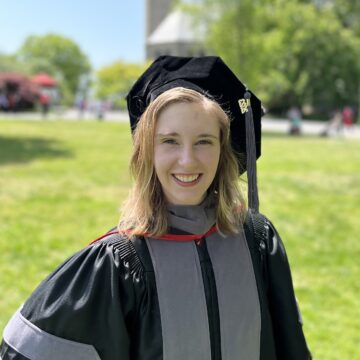 Presentation Title: “Bird Flu: From Moo to You”
Presentation Title: “Bird Flu: From Moo to You”
Special Committee Chair: Renata Ivanek
Area of Research: Dairy cattle epidemiology and One Health
Biography: Kat Koebel, D.V.M. ’23, is from Lake Zurich, IL. Her passion for dairy cattle health has carried her through four years in Cornell’s vet school, and now two years of her Ph.D. in epidemiology. Outside of the lab/barn, she enjoys her artistic outlets of writing, dancing, and ear-splitting karaoke!
Favorite Thing About Cornell: The cows, of course!
Maciej Olszewski, physics doctoral candidate
Watch Maciej Olszewski’s presentation.
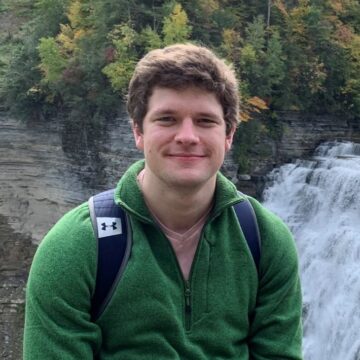 Presentation Title: “The Rivalry Between Oxygen and Quantum Computing”
Presentation Title: “The Rivalry Between Oxygen and Quantum Computing”
Special Committee Chair: Dan Ralph
Area of Research: Quantum information
Biography: Maciej Olszewski is a doctoral candidate in physics. His research focusses on exploring new materials and techniques used for quantum computing technologies.
Favorite Thing About Cornell: Nature and fresh air with many outdoor activities.
Kasim Saiyyad, applied economics and management doctoral candidate
Watch Kasim Saiyyad’s presentation.
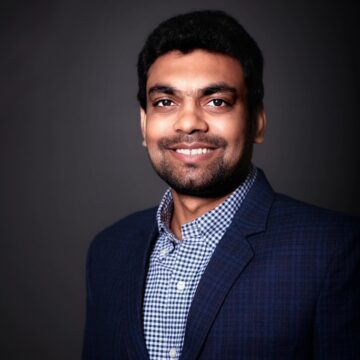 Presentation Title: “When Does Free Money ‘Cost’ You?”
Presentation Title: “When Does Free Money ‘Cost’ You?”
Special Committee Chair: Prabhu Pingali
Area of Research: Public welfare programs in developing countries
Biography: Kasim Saiyyad is a Ph.D. candidate in applied economics and management at Cornell and a Tata-Cornell Scholar. His research examines how government welfare programs impact household dynamics in developing countries, with field work conducted in India. He completed his M.S. at Cornell before beginning doctoral studies.
Favorite Thing About Cornell: The fall foliage that transforms campus into an inspiring masterpiece.
Viral Shukla, food science and technology doctoral candidate
Watch Viral Shukla’s presentation.
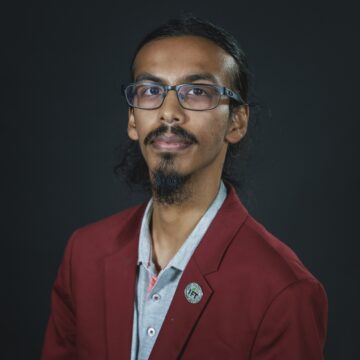 Presentation Title: “A Food Systems Approach to Putting Food Waste on Your Plate”
Presentation Title: “A Food Systems Approach to Putting Food Waste on Your Plate”
Special Committee Chair: Olga Padilla-Zakour
Area of Research: Novel food processing, waste upcycling
Biography: Viral Shukla is a science of food activist, a role in which he strives to educate the public on the food we eat. His research evolves around transforming food waste into value-added products by studying their technical, economic, and sensorial feasibility.
Favorite Thing About Cornell: The community of scholars.
2025 Final Round 3MT Competition
- The 2025 final round competition was held in person on March 19, 2025 at 3 p.m. ET.
- At the live competition, First Place, Second Place, and People’s Choice awards were selected by judges and audience members.
- The First Place winner will be eligible to represent Cornell in any additional Ivy League or northeast regional competitions held in 2025.
Three Minute Thesis (3MT®) is an international competition to help graduate students develop and showcase their research communication skills. The annual university-wide competition hosted by Cornell Graduate School challenges research-degree students to present their dissertation as a compelling story in just three minutes, with one slide, in language appropriate to a non-specialist audience.
Preliminary Round Competition
- All competitors must submit a recorded presentation of their talk by 12:00 p.m. ET on Friday, February 21, 2025 in order to compete in the Preliminary Round.
- All enrolled graduate research degree students at the research stage (with at least some results to share) are eligible. Past competitors who did not place, and are still enrolled as graduate research degree students this year are welcome to enter the competition again.
Fill out the interest form to receive updates on the Cornell 3MT competition. If you should have questions or concerns regarding the 3MT Competition, please email us at: grad3mt@cornell.edu.
